The agreement signed by India at the 14-member Indo-Pacific Economic Framework for Prosperity (IPEF) that seeks to address the vulnerabilities and disruption in supply chains would not in any way take away the country’s sovereign rights to impose export restrictions on products or change tariffs, a senior official said Tuesday.
Another IPEF agreement on “fair economy” dealing with corruption where members have almost completed the task of negotiations, gives a big support to India’s efforts to bring back proceeds of crime and corruption parked overseas, the person added.
The IPEF members have also completed negotiations on the clean economy pillar. Negotiations phase at the IPEF is over for India as it is not part of the negotiations on trade.
Under the IPEF Fair Economy Agreement members have resolved to cooperate for combating corruption and seizing proceeds of crime. The fair economy agreement deals with exchange of information for tax purposes, sharing of financial intelligence, cooperation on investigation, prosecution of transnational anti-corruption cases and countering the financing of terrorism.
The joint statement on fair economy also said member countries would “adopt or maintain measures enabling the identification, tracing, freezing, seizure, and confiscation in criminal or civil proceedings of proceeds of crime, consistent with the UN’s Convention against Corruption, and other actions to promote transparency and accountability in the return and disposition of recovered proceeds of crime, and strengthen international cooperation on asset recovery.
Another official said India’s “offensive ask in this agreement is to facilitate asset recovery of crime proceeds”.
The supply chain resilience agreement was signed by IPEF member countries on November 15 where they have committed to work closely to ensure that supply chains of the signatories work smoothly and in case anyone faces any disruption or a crisis others extend a helping hand.
The main three elements of the supply chain pact include cooperation, information sharing, working together for an emergency response; cooperation in critical sectors; and embedded services.
“Under the supply chain agreement, there is nothing where in our policy space to exercise our rights of change in tariffs or change in export policy…whatever is necessary for the country’s food security or any other requirement of the country also, that policy space remains with us,” Additional Secretary in the commerce ministry Rajesh Agarwal said.
India frequently imposes such export restrictions to curb rising prices for essential commodities like rice, onions and export taxes on minerals.
There were reports that the supply chains agreement might ask members to share advance information on changes in tariffs so that others have the room to adjust and supply chains remain unaffected, Agarwal clarified India will not have to provide any kind of advance information to IPEF members about changes in customs duties.
Agarwal said that there was a mention of putting “unnecessary” export restrictions, but it is caveated and is similar to the World Trade Organisation (WTO) provisions and not beyond that.
If a country imposes any export curb without giving any justification, that is treated as unnecessary and India’s action on export curbs or tariffs are backed by valid reason.
“I do not see that there is any policy space issue as far as the export restrictions are concerned…We have not constrained our policy space by doing that,” he added.
The IPEF was launched in Tokyo in May last year. The 14 members of the IPEF are India, US, Australia, Brunei, Fiji, Indonesia, Japan, Republic of Korea, Malaysia, New Zealand, Philippines, SIngapore, Thailand and Vietnam and together they account for 40% of the world economic output and 28% of trade. The goal of IPEF as stated in the official statements is to strengthen the economic engagement among partner countries with the goal of advancing growth, peace and prosperity in the region.
The framework is structured around four pillars relating to trade, supply chains, clean economy and fair economy (issues like tax and anti-corruption). India has joined all the pillars except the trade one.
